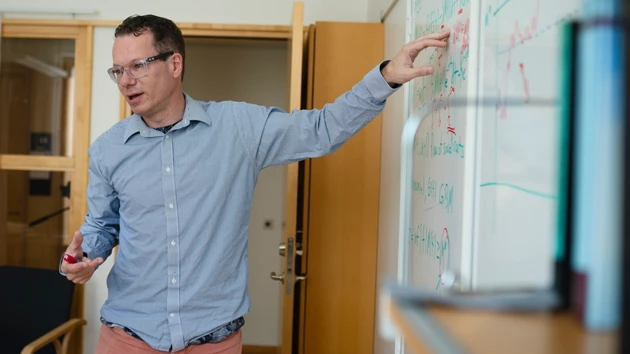Christian Ewald
Master's Programme in Mathematical Statistics
Financial Engineering

About the specialisation
Studying financial engineering opens diverse and rewarding career opportunities, giving you the skills to solve complex economic and financial challenges. This education combines essential knowledge from mathematics, statistics, computer science, and finance, focusing on real-world applications. The education is tailored for roles such as quantitative analyst, financial risk manager, algorithmic, or derivatives trader, providing you with a competitive edge on the job market.
While studying
The specialisation in Financial Engineering starts with a semester focused on developing essential analytical and modelling skills, emphasizing mathematical techniques for understanding economic systems, risk assessment, and financial processes. Students build a foundation in modelling economic behaviour and explore stochastic processes.
Degree project – often industry-partnered
The education continues in the spring with advanced methods in data analysis and decision-making under uncertainty, covering critical skills for forecasting, evaluating financial risks, and derivative pricing. The second year introduces cutting-edge techniques in artificial intelligence, focusing on applying deep learning models in trading and risk management. Risk identification and mitigation are emphasized, equipping students with robust strategies for enterprise-level risk management. The final semester centres on an independent or industry-partnered research thesis, allowing students to apply their expertise in a practical financial engineering project.
Many of the courses are given as hybrids so that you can follow them either on-site or on-line.
Umeå – fintech capital of the north
Umeå has been referred to as the Fintech capital of the north and hosts key financial industry, including Clearstreet, Nasdaq, and Vermiculus, to whom the institute has close connections. Collaborations include student projects, internships, job seminars, and research projects, providing you with many opportunities to meet potential future employers. The Financial Engineering research group at Umeå University is among the leading groups in Northern Europe and offers a world class academic ambiente.
Courses within the programme
Year 1
Autumn S1 (30 ECTS):
- Mathematical Modelling of Economic Systems (50%) & Research in the Mathematical Sciences (50%)
- Non-life Insurance Mathematics (50%) & Stochastic Differential Equations (50%)
Spring S2 (30 ECTS):
- Time Series Analysis (50%) & Investment under Risk and Uncertainty (50%)
- Financial Mathematics (50 %) & Monte Carlo Methods for Financial Applications (50 %)
Year 2
Autumn S3 (30 ECTS):
- Deep Learning in Finance (new course from autumn 2026) (50%) & Enterprise Risk Management (50%, first half)
- Elective Course (50%)* & Enterprise Risk Management (50%, second half)
Spring S4 (30 ECTS):
- Master’s Thesis (usually in collaboration with industry)
*As elective courses, we suggest to pick among the following courses: Multivariate Data Analysis, Statistical Learning with High-dimensional Data, Numerical Methods for PDE, Stationary Stochastic Processes and Statistical Inference.
Dedicated lecturers and a world-class academic environment
While studying, you will meet the following lecturers:
Christian Ewald, professor

After a PhD in Algebraic Topology at the University of Heidelberg in Germany, I discovered a great interest in using mathematics to explore and solve problems in finance and economics. After more than 20 years in the fields of Quantitative Finance and Financial Engineering, I am now one of the leading experts in Europe and have published more than 70 research articles in leading journals. I have taught on programs in Quantitative Finance and Financial Engineering at Universities in the UK, Australia, Germany, Norway and Sweden for many years, with close connections to the financial industry.
I am responsible for the following courses:
Kevin Kamm, associate professor

Kevin Kamm.
While studying mathematics at the Technische Universität Berlin, I discovered a strong fascination for stochastic analysis and financial mathematics. This led me to pursuing a Ph.D. in financial mathematics as a member of the ABC-EU-XVA project at the University of Bologna. Today, I am thrilled to be conducting cutting-edge research on optimal strategies within the area of commodities, leveraging the power of Deep Learning techniques to make current models more realistic. I am also very intrigued by the exciting possibilities of high-performance computing (HPC) in the context of SPDEs and financial mathematics in general.
I am responsible for the following courses:
- Stochastic Differential Equations
- Financial Mathematics
- Monte Carlo Methods for Financial Applications
- Deep Learning in Finance (new course in the fall 2026)
Markus Ådahl, associate professor

Markus Ådahl.
I am an associate professor at the department of Mathematics and Mathematical Statistics and was previously an actuary at a life insurance company for eight years, where I worked with valuation of liabilities, balance sheet modelling, stress tests and investment strategies.
I am responsible for the following courses:
Jonas Westin, associate professor

Jonas Westin.
I work as an associate professor at the Department of Mathematics and Mathematical Statistics and as a researcher at the Centre for Regional Science (CERUM). A common denominator in my research is the use of mathematical methods and models to investigate mainly problems in social science. Mathematical models and statistics are used in many contexts to produce decision material in both the private and public sectors. In my research, I examine how different types of mathematical and statistical assumptions affect the conclusions and recommendations that the decision models provide.
I am responsible for the following courses:
Future and career opportunities
Financial engineers are in high demand on the job market across a wide range of sectors and positions and can look forward to an excellent salary progression. Pursuing this specialisation offers a wealth of opportunities and advantages, including:
Bridges theory and real-world application
Financial engineering isn’t just theoretical; it emphasizes real-world application. You’ll use simulations, historical data, and case studies to apply what you learn, making you job-ready right after graduation.
High demand in finance and technology
Financial engineers are in high demand in banks, hedge funds, asset management firms, insurance companies, fintech companies, and even tech giants that work with financial data.
As markets and financial products become more complex, there is an increased need for professionals who can analyze risk, design new financial products, and optimize investment strategies using quantitative methods.
Versatile skill set
Financial engineering combines mathematics, statistics, computer science, and finance, offering a robust skill set that’s versatile and transferable.
These skills are applicable not only in finance but also in areas like data science, machine learning, and artificial intelligence, where similar quantitative and programming skills are highly valuable.
Lucrative career opportunities
Financial engineering roles often come with competitive salaries and attractive bonuses. Positions like quantitative analyst, financial risk manager, algorithmic trader, and derivatives trader are some of the most well-compensated in the industry.
Adaptability to market changes
With a background in financial engineering, you are well-equipped to adapt to rapidly evolving market conditions. The knowledge of quantitative models, risk management, and algorithmic trading helps you stay relevant as new financial technologies and regulatory frameworks emerge.
Apply
-
Autumn 2026
-
Master's Programme in Mathematical Statistics, Financial Engineering
International admissions round
HT26 / Umeå / English / On site
Show more Show less
StartAutumn term 2026
Type of studiesOn site
Study pace100%
Length2 years
Study locationUmeå
LanguageEnglish
Application codeUMU-M5074
EligibilityA Bachelor's degree or equivalent first-cycle qualification comprising of at least 180 ECTS or a corresponding qualification from an internationally recognised university. Specific entry requirements are at least 30 ECTS in Mathematics, at least 15 ECTS in Mathematical Statistics or Statistics, and at least 7,5 ECTS in Programming Methodology, or equivalent. Proficiency in English equivalent to Swedish upper secondary course English 6/level 2.
SelectionAcademic credits completed by the last application date (in the range of 30-285 credits equivalent to ECTS)
ApplicationApplication deadline was 15 January 2026. The application period is closed.
Application and tuition feesAs a citizen of a country outside the European Union (EU), the European Economic Area (EEA) or Switzerland, you are required to pay application and tuition fees for studies at Umeå University.
Application fee: SEK 900
Tuition fee, first instalment: SEK 76,150
Total fee: SEK 304,600
-
Master's Programme in Mathematical Statistics, Financial Engineering
Second admissions round for EU/EEA citizens
HT26 / Umeå / English / On site
Application opens 16 March 2026Show more Show less
StartAutumn term 2026
Type of studiesOn site
Study pace100%
Length2 years
Study locationUmeå
LanguageEnglish
Application codeUMU-P5074
EligibilityA Bachelor's degree or equivalent first-cycle qualification comprising of at least 180 ECTS or a corresponding qualification from an internationally recognised university. Specific entry requirements are at least 30 ECTS in Mathematics, at least 15 ECTS in Mathematical Statistics or Statistics, and at least 7,5 ECTS in Programming Methodology, or equivalent. Proficiency in English equivalent to Swedish upper secondary course English 6/level 2.
SelectionAcademic credits completed by the last application date (in the range of 30-285 credits equivalent to ECTS)
ApplicationThe online application opens 16 March 2026 at 09:00 CET. Application deadline is 15 April 2026. Please note: This second application round is intended only for EU/EEA/Swiss citizens.
Application and tuition feesAs a citizen of a country outside the European Union (EU), the European Economic Area (EEA) or Switzerland, you are required to pay application and tuition fees for studies at Umeå University.
Application fee: SEK 900
Tuition fee, first instalment: SEK 76,150
Total fee: SEK 304,600
-
How to apply
Apply online via universityadmissions.se
You apply to our programmes and courses via universityadmissions.se – the official website for higher education applications in Sweden. There, you can track your application, check that your documents have been registered, and log in to find our your admission results.
Late applications
Admissions to most programmes and courses typically close after the final application deadline. However, some programmes and courses may still accept late applications if seats are available. These are marked “Open for late application” on universityadmissions.se. Please note that late applications are not guaranteed to be reviewed.
More about application and admission